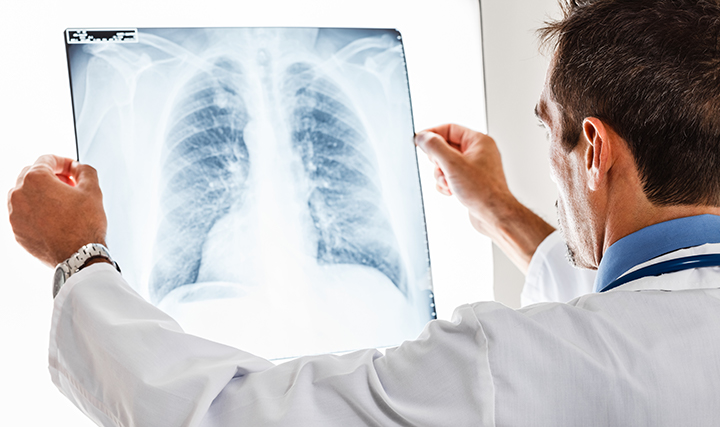Blog

What Is Metastatic Breast Cancer?
Metastatic breast cancer, which may also be referred to as Stage IV breast cancer, indicates that cancer has spread from the breast tissue and the nearby lymph nodes to other organs in the body, most commonly the bones, lungs, liver or brain. Any type of breast cancer (estrogen-positive, HER2-positive, etc.) can metastasize (spread) to other areas of the body. When a tumor is found outside of the breast, it's made up of breast cancer cells. For example, if you have a tumor in the lungs that is metastasized breast cancer, it contains breast cancer cells, not lung cancer cells. These...

The Long-Term Side Effects of Cancer Treatment
Cancer treatments such as chemotherapy and radiation are designed to kill fast-growing cancer cells. These powerful drugs travel throughout the body and may affect healthy, normal fast-growing cells as well. The type of long-term side effects cancer survivors face and the severity differs between individuals. Some may experience minimal long-term effects, while others may experience moderate to severe long-term effects. There are many different types of cancer and many different types of treatment. This combined with the fact that everyone's body responds...

What You Can Expect During Your First Mammogram
If you are preparing for or anticipating having to schedule your first mammogram, you may be wondering what to expect. A mammogram is a non-invasive diagnostic scan essential for early detection of breast cancer. It can be an inexpensive and highly effective method for reducing breast cancer risks. Having regular mammograms can be critical for those with a higher risk level or history of family breast cancer of any age. Today, we'll provide a guide to preparing for your first mammogram and outline what you can expect during your first screening. When Should You Have Your First...

9 Surprising Signs of Lung Cancer That Don’t Involve the Lungs
Most people assume that symptoms of lung cancer are related strictly to the lungs and complications related to breathing. Sometimes this is accurate. Lung cancer often has symptoms like coughing up blood and mucus, shortness of breath, persistent cough, and chest pain. However, some symptoms seem to have nothing to do with the lungs. While there are many breathing-related symptoms of lung cancer, other surprising symptoms exist. Here are 9 surprising symptoms of lung cancer that don't involve the lungs. 9 Symptoms That Could Mean Lung Cancer Clubbing of the nails Hoarse...

Skin Cancer Risks in Winter
Arizona means living with sunshine year round, even when it’s not super hot outside. That can be dangerous for your skin. Some people believe that the cooler weather in winter decreases their risk of developing skin cancer. The truth is, regardless of the temperature outside, the sun can still cause skin damage. All sun exposure can lead to a higher risk of skin cancer–even in those winter months that aren’t super hot. Skin Cancer Risks in Winter Protecting your skin from skin cancer is a year-round job. Why? Because harmful ultraviolet (UV) rays are always being...

Lung Cancer Risks, Signs, Symptoms & Screening
Lung cancer is the leading cause of cancer deaths in the United States amoung men and women. There are some lifestyle choices you can make to try and reduce your risk of getting lung cancer. Being aware of the symptoms to look for is helpful in catching the disease early and having a better treatment outcome. For people who have a family history of cancer, screening becomes even more important, since that population is at a higher risk of developing the disease. The information below is meant to be used as a guideline. Individuals experiencing any of these symptoms should...

7 Things You Didn’t Know About Prostate Cancer
Prostate cancer is the most common cancer among men, about 1 in 9 men will be diagnosed in their lifetime. Below are seven things that you may not know about prostate cancer that can help you detect it earlier and understand this type of cancer better if you have received a diagnosis. The majority of men survive a prostate cancer diagnosis. Prostate cancer can affect men of all ages. Symptoms may be difficult to recognize. It can be hereditary. Treatment isn’t always the first option. Prostate cancer is more common in some races. Lifestyle may affect your likelihood of getting prostate...

How to Read a Prostate Cancer Pathology Report
If you’re scheduled for a prostate biopsy, your doctor is likely testing a tumor for cancer. During this outpatient procedure, tissue will be removed from the tumor using a needle. It will then be analyzed by a pathologist, a doctor who reviews the results of the biopsy and provides information about the findings. The results of your biopsy are provided in a pathology report. Your oncologist or urologist will use the pathology report as a key piece of information in determining if cancer is present and the stage, based on the cell structure in the tumor. It will also play a key role in...

The Importance of Breast Cancer Research
Even though statistics show 1 in 8 U.S. women will be diagnosed with breast cancer, there is hope on the horizon. Overall, survival rates continue to rise and women are living longer after beating the disease. In order to keep this momentum, however, which can lead to improved care and better outcomes, it’s necessary to continue advancing our understanding of the disease through research. Breast cancer research opens the door to finding better ways to prevent, detect, and treat breast cancer, and to improve the quality of life of both cancer patients and survivors. From studying...

Options for Lung Cancer Treatment
According to the American Cancer Society, lung cancer is the leading cause of cancer death in the United States , with about 222,500 new cases and 155,870 deaths each year. Fortunately, lung cancer deaths have begun to decline, due to a decrease in smoking. The field of cancer care has also advanced faster than most fields in medicine, and major progress has been made in lung cancer treatments, including surgery (delivered by thoracic surgeons), radiation treatments for lung cancer (delivered by radiation oncologists) and systemic therapies (delivered by medical oncologists)....


